#misconceptions
Explore tagged Tumblr posts
Text
STOP bringing shifttok misinfo on shiftblr.

Shifting is easy. If you believe otherwise you're not educated enough on it.
You shift every moment.
You don't need a method to shift.
Scripting is not necessary. Even if you do script it doesn't have to be detailed.
You are pure consciousness regardless of what you're doing.
You don't even need an intention to shift.
Physical symptoms have nothing to do with shifting.
Consciousness is not in you, you are in consciousness.
You can still shift if you're lazy, effort is not required.
Only you can shift yourself, stop depending on others.
Attempts don't exist. You're always shifting. There's no failed shifting 'attempt'.
You can still shift with self-doubt.
Shifting is not a process.
Shifting is instant, your cr is your past.
FOR THE LOVE OF GOD STOP SAYING YOU'RE SABOTAGING YOURSELF!!! It's manifesting because you're letting it.
There is no such term as minishifted, a shift is a shift.
You don't have an OR (original reality) you're shifting every second you're not bound here.
CR=DR they're the same, the only thing that separates you is the mindset.
You don't need to affirm 24/7.
It's not necessary to reprogram your subconscious.
You can shift for whatever reason it's your reality.
You don't have to feel it real you'll get it anyways. But if it helps congratulations.
Feeling your feels no matter how 'negative' won't stop you from shifting.
Yes you can script ANYTHING.
"but I've tried everything" have you tried letting it go?
Shifting is a decision not magic.
Dreaming and Lucid dreaming are a part of shifting.
You shift even when you're sleeping there's no exception to shifting.
DRs already exist. People didn't create them, they chose them.
#shiftblr#reality shifting#shifters#shifting blog#shifting community#shifting#shifting antis dni#shifting reality#misconceptions#shifting mindset#shifting misconceptions#shifttok#shifttok is so shit#shifting consciousness
6K notes
·
View notes
Text
i hate the misconception that asexual=no libido, because No the fuck it doesn't
Asexual people can still get horny, we can still masturbate, we can still have and enjoy sex*
Asexually is a lack of Sexual Attraction not a lack of horny
AND That's not even getting into how asexual is an Umbrella Term and so some asexuals DO feel sexual attraction in certain situations like demisexuals and greysexuals
*Many asexuals don't like or want sex, myself included, but some do, we aren't a monolith that has the same opinions on everything
4K notes
·
View notes
Text
MISCONCEPTIONS ABOUT ASEXUAL PEOPLE
(By an asexual person x)
Asexual = Aromantic/Aroace
I get SO frustrated whenever people think that asexual people can't experience romantic attraction, because....they can? Sure, some people identify as asexual AND aromantic (aroace), but not all asexual people identify as aromantic. Like, I'm asexual, but I'm also a lesbian, because I'm romantically attracted to women.
All asexual people are sex-repulsed
Yeah, some asexual people are sex-repulsed, but not all are. I'm not gonna say whether I am or not, but asexuality is a spectrum. Some people might have sex because they enjoy it, some might have sex because they feel an emotional connection to the person, and there's tons of other reasons why an ace person would have sex.
Asexual people are emotionless
That's just not true. I can feel connected to people, platonically or romantically, without feeling sexual attraction to them. I can also feel emotions in general, because some people are convinced that ace people are fucking robots or something just because they lack sexual attraction.
Asexual people hate anything to do with sex
No. My favourite pieces of media often have a sexual sense of humour, I myself have a sexual sense of humour, I read/write smutty fanfiction, etc. Sure, some asexual people hate anything to do with sex, but the same goes for allosexual people.
Asexuality = Celibacy
Celibacy is the CHOICE to not have sexual relations with people. Asexuality isn't a choice, and again, asexuality is a spectrum. Some ace people might want to remain celibate, and some might not.
There's TONS of other misconceptions, but I'm only gonna cover these ones for now.
Edit: I'm so happy this post is getting attention lol. I made it to spread awareness, and I'm happy people are seeing it! I only found out I was ace the day I posted this, and I'm really happy to have finally found myself, and put an end to the endless stress and questioning I was having about my sexuality <3.
To all the other people on the ace spectrum out there, whether you're aroace, demisexual, aceflux, graysexual, or anything else, YOU ARE VALID. Whether you're sex-repulsed or not, YOU ARE VALID. Whether you've known for years, or for less than a week (like me haha), YOU ARE VALID. And don't let ANYONE tell you any different.
534 notes
·
View notes
Text
The Misconception of Selfishness in Autistic Individuals








The Autistic Teacher
#autism#actually autistic#misconceptions#plans and routine#showing empathy#small talk#fairness#working alone#meeting accommodations#neurodiversity#actually neurodivergent#feel free to share/reblog#The Autistic Teacher (facebook)
602 notes
·
View notes
Text
I'm curious about this.
Both of these readings are obviously wrong and reductive, and I've read long arguments against both. But which one is more common? Which one has distorted more people's views of the book?
130 notes
·
View notes
Text
Prompt 66
Geralt is sure the bard he's started traveling with is a monster. I mean, an inhumanely beautiful young man with an inhumanely wonderful voice, and an inhumanely positive outlook on everything involved in Geralt's life? Bullshit. And he stayed. Even after the incident with the elves, where he had sad little puppy eyes - that were much too heartwrenching to not be magic - after his lute was smashed. Sure, he got a new and better lute, but surely he'd wanna leave by now.
Geralt starts testing. An "accidental" graze of silver against the bard's skin. Too much garlic on their food. A circle of salt. Fucking anything that reveals what he is! Jaskier, the human, is endeared endlessly with Geralt's shenanigans. How paranoid the poor witcher must be, if he keeps checking to make sure Jaskier hasn't been replaced with a monstrous lookalike in the night!
#geraskier#the witcher#geralt x jaskier#geralt x dandelion#witcher fanfiction#fanfiction prompts#geralt loves his bard!#requited unrequited love#writing prompts#friends to lovers#gerlion#comedy#angst and comedy#angst with a happy ending#comedy with a happier ending#shenanigans#miscommunication#misconceptions#misunderstandings
458 notes
·
View notes
Text

#history#historical#misconceptions#boer war#ottoman empire#norman conquest#wordplay#phonics#wronghands#john atkinson#webcomic#funny
197 notes
·
View notes
Text
I want to briefly adress another BIG misconception about Greek gods that has (quite recently) been going on around the Internet. And it is again part due to the Percy Jackson TV show. I insist on the "TV show", because as we now know, the TV show made some changes to the book's original plotline when it came to the gods interacting with their children (like Athena's move with Echidna *cough cough*), and as a result here is what I have been hearing here and there.
"Yeah, well the Greek gods were all assholes, right, but what PJ REALLY got right was that they were especially assholes to their own children and the worst abusive parents ever".
... No?
In fact this is almost a counter-interpretation of Greek mythology, because in Greek myths and legends, the whole point was that, when a god was being an "asshole" as you say, they were an asshole to everybody... except their children. One of the reasons the Greek gods can look "bad" by modern standards is precisely because they had an habit of favorizing their own children, and taking care about them more than about other beings.
The most famous of these myths is of course Demeter's immense love and hyper-protection of Persephone - just look at the trials she went through to find her back after she disappeared.
Another famous example is how Poseidon turned on Odysseus and plagued him with curses and monsters for blinding his son - Polyphemus the cyclop (and the whole point here is that Poseidon favorized his son, despite his son being the actual criminal and monster in the case)
Ares, who was not one of the best gods, still went on an avenging mode every time his children were attacked, from the dragon slain by Cadmos to the rape of Alcippe.
There's how Apollo went berserk after the death of Asclepios. There's how Herakles had planned to be favorized by Fate since his birth thanks to Zeus, and how the entire reason Zeus inflicted on his wife the atrocious torture of hanging chained up by the sky was because he had enough of her constantly tormenting Herakles in the worst ways possible. Even Athena ended up taking care of Erichthonius as her own child despite her not being his true mother - showing that even the virgin, sexless, childless goddess has a mothering side to her.
It all goes back to Gaia, and how she keeps turning against Zeus for each time vanquishing her children - from the Titans, to the Giants, to Typhon - despite these children being again, bad news and even hurting Gaia herself. Another example of "primordial motherhood": Nyx shelters Hypnos from Zeus' wrath in the Iliad, and not even Zeus would dare anger such an elderly mother-goddess. And if we push beyond the boundaries of Greek mythology and into the very late Roman literature, we see this trend continues with Aphrodite's smothering-mothering of Eros during the Psyche legend.
A good lot of conflicts and feuds and problems in Greek mythology was precisely due to how much the gods loved their children, and how protective they were of them - with the problem that the god had the tendency to be blind to whether their children were good or evil, victims or criminals.
This is why, for example, Zeus and Hera's relationships to their children were especially important and unique in Greek myths, in the light of this god's tendency to favorize and spoil and protect their own children.
On Hera's case, her action of, for example, throwing Hephaistos into the sea at birth just because he is "ugly" is meant to come off as massively shocking. Remember that in a good bunch of Greek myths, Hera had a negative, evil, dangerous side to her, that popped up in various ways - from her jealous, vain, angry personality to how in some versions she literaly gave birth to Typhon... Unlike Zeus, who was the "ultimate father", Hera wasn't (in myths, I insist) seen as a postive mother, and was more of a mother-of-monsters avatar (after all, she did command a lot of Greek monsters), or an anti-mother (she was the one who prevented Leto from giving birth, a powerful symbol).
On the other side, Zeus was also seen regularly punishing or being very harsh to his children, but there was the secret to his character: Zeus had to act both as a father, and as a king. He embodied the all loving ancestor and the all powerful father, but he also had to act as the embodiment of law and of justice, and those two aspects of his personality clashed a lot. We see him punish his divine children regularly, but almost always because his role as the enforcer of the law primed over his role as a father - for example when he wanted to throw Apollo into Tartarus because he had caused a Cyclop genocide out of anger. But he still had this same "over-parenting" side as the other gods. Again, Herakles was one of his favorite children and he tried to arrange everything so that he could have the greatest life ever - but his official side as the "political" and "civilization" god caught up to him when Hera tricked him into swearing away the gifts he had intended for Herakles. Despite Zeus' immense love for his son, his oath and the law he embodies took over and prevented him from sheltering Herakles from Hera's hatred. The most revealing case of this "father vs king" aspect of Zeus' personality comes from the Iliad: it is the death of Saperdon.
When Zeus looks upon the Trojan War and sees that his son will soon die, he is very heavily tempted from interfering. He explicitely wishes to save him, and to change the scales of fate to avoid his impending death (because remember in the Iliad Zeus was still the god of fate who literaly weighed humans' destinities in his scale). That's his "father" side showing up. But then Hera, who is by his side, who is his queen and thus his "political" side, reminds him of his duty as a king and of his role as ultimate judge of the world and ruler of the gods. She points out he would break the very own law he imposed of not interfering with the mortal conflict. She reminds him that, as the setter of examples, if he saved Sarpedon, he would create a precedent and other gods could also start saving their own children from the war. She reminds him that he has a role as the god of law and fate, and that he can't allow his personal feelings to interfere in the matter, else he would be unfair and unjust. And thus, Zeus resignates himself to let his son die before his eyes - but he still shows his immense love for him by both sending a shower of blood as a sign of his grief, and then ordering Apollo, Hypnos and Thanatos in person to carry Sarpedon's corpse away (predating future legends about great kings and heroes taken into the afterlife by supernatural figures, like Arthur collected by Morgan and the ladies of Avalon).
In conclusion: having the gods act as if they were all bad, abusive, absent parents not getting involved in their children's life or not caring about them is actually going against what the mythology originally said in terms of characterization. The untold rule of Greek mythology was that, if gods were bad parents, it would be because they were too loving, too protective, too smothering, too spoiling, interfering too much. Not the other way around - unless you were Hera, of course. Meanwhile, having the gods act as "assholes" and bullies towards OTHER GODS' children, now that would be accurate to Greek mythology (this is the very basis of Hera's cycle of legends as a persecuting goddess). But the gods usually stuck by the side of their own children - a bit like how in a school's football or soccer game the parents end up fighting each other because of what their children did or did not do in the game.
689 notes
·
View notes
Text


forgotten kirby facts 68 - there is a misconception morpho knight was a beta design for meta knight, this is not true, as morpho was confirmed to be a planned boss for the scrapped gamecube kirby game in an interview.
the misconception likely originates that morphos design was unexplainably featured in meta knights page in the dream collection commemorative book.
(book footage, interview translation) (submitted by @lowrezbonuslevel)
#this gets v obvious when you consider the art style difference between morpho n the adventure characters#n the fact adventure is a 8 bit game.not even its mask would translate well to that kinda pixel art#let alone the patterns#forgotten kirby facts#kirby#beta concepts#morpho knight#meta knight#misconceptions#from interview#2000s#hits
163 notes
·
View notes
Text
ableist NTs: adderall is basically meth! you just need a planner and a cup of coffee. You don’t need “focus pills”, just try harder! Buy a calendar! ADHD is made up by big pharma to sell drugs!
me the other day when I didn’t take my meds: do I have to pee? I think? I think I have to pee. Okay, body, get up. Please get up. Have I eaten yet? I think I might be hungry. But didn’t I eat this morning? Okay body, let’s get up and pee. Okay. Any minute now I’ll go to the bathroom and eat. Oh my gosh it’s four pm. Why won’t my body move? It’s like I’m stuck in concrete. do I have to pee? Oh dizzy. It’s ten pm?! Maybe I should eat…
#adhd#actually adhd#interoception#neurodivergent#adhd problems#adhd brain#adhd things#living with adhd#adhd life#ableism#misconceptions#text post#text#neurospicy#mental health
298 notes
·
View notes
Text
I find it really funny that one of the biggest misconceptions in the Splatoon series is that Inklings and Octolings will literally die if a single bit of water touches them. They are so hydrophobic that they melt and die from water despite that never EVER being the case in the Japanese and European versions of Splatoon 1.
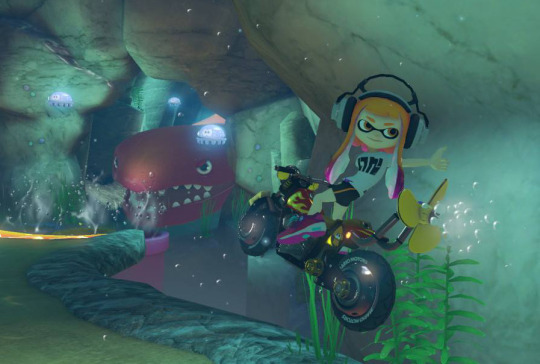
Inklings and Octolings can't swim due to gameplay reasons, they poof when they land in water because again, it's a gameplay mechanic and water is meant to be a hazard in the stages. In Splatoon 1 (JP and European versions) Callie and Marie state in some of the stage announcement dialogue that Inklings just suck at swimming (probably due to thousands of years avoiding water and not swimming as much as they used when they were squids. There's your lore reason right there if you want one.)
It's really annoying when people tie a gameplay mechanic to lore and worldbuilding when it's just there for GAMEPLAY and GAMEPLAY ONLY!!!!!!!! I know that it's fun to talk and discuss about certain things like this, but it's pretty clear that water is just a hazard for gameplay and not because Inklings and Octolings literally dissolve in water.
It really wouldn't make sense lore wise too because Inklings and Octolings are descendants of squids and octopuses that went onto land, why would they over the course of thousands of years develop genetics that makes them melt if they touch water? They don't even address that in Alterna when explaining the backstory of the sea creatures in modern times. Why do the jellyfish get to be able to swim in water but the Inklings and Octolings can't? What makes them different? Can Inklings and Octolings touch a certain amount of water before they feel the effects? Do the Inklings and Octolings have to be fully submerged in water for them to die? Is it because Inklings and Octolings are made out of mostly ink and they explode in water like a bath bomb? That sounds way too morbid. Then again, Marie did say something about how Inklings have oily skin that doesn't go well with water in Splatoon 2, i don't know. This is stupid LMAO.
#splatoon#inkling#octoling#lore#ramblings#rambles#misconceptions#marie splatoon#marie cuttlefish#callie splatoon#callie cuttlefish#splatoon 2
94 notes
·
View notes
Text
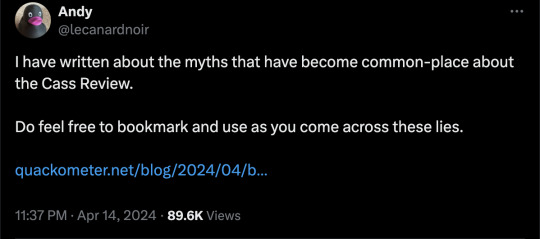
By: Andy L.
Published: Apr 14, 2024
It has now been just little under a week since the publication of the long anticipated NHS independent review of gender identity services for children and young people, the Cass Review.
The review recommends sweeping changes to child services in the NHS, not least the abandonment of what is known as the “affirmation model” and the associated use of puberty blockers and, later, cross-sex hormones. The evidence base could not support the use of such drastic treatments, and this approach was failing to address the complexities of health problems in such children.
Many trans advocacy groups appear to be cautiously welcoming these recommendations. However, there are many who are not and have quickly tried to condemn the review. Within almost hours, “press releases“, tweets and commentaries tried to rubbish the report and included statements that were simply not true. An angry letter from many “academics”, including Andrew Wakefield, has been published. These myths have been subsequently spreading like wildfire.
Here I wish to tackle some of those myths and misrepresentations.
-
Myth 1: 98% of all studies in this area were ignored
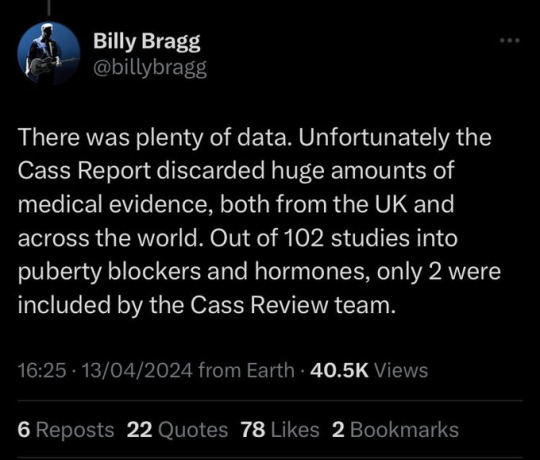
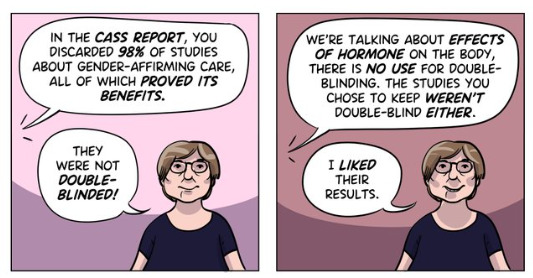
Fact
A comprehensive search was performed for all studies addressing the clinical questions under investigation, and over 100 were discovered. All these studies were evaluated for their quality and risk of bias. Only 2% of the studies met the criteria for the highest quality rating, but all high and medium quality (50%+) studies were further analysed to synthesise overall conclusions.
Explanation
The Cass Review aimed to base its recommendations on the comprehensive body of evidence available. While individual studies may demonstrate positive outcomes for the use of puberty blockers and cross-sex hormones in children, the quality of these studies may vary. Therefore, the review sought to assess not only the findings of each study but also the reliability of those findings.
Studies exhibit variability in quality. Quality impacts the reliability of any conclusions that can be drawn. Some may have small sample sizes, while others may involve cohorts that differ from the target patient population. For instance, if a study primarily involves men in their 30s, their experiences may differ significantly from those of teenage girls, who constitute the a primary patient group of interest. Numerous factors can contribute to poor study quality.
Bias is also a big factor. Many people view claims of a biased study as meaning the researchers had ideological or predetermined goals and so might misrepresent their work. That may be true. But that is not what bias means when we evaluate medical trials.
In this case we are interested in statistical bias. This is where the numbers can mislead us in some way. For example, if your study started with lots of patients but many dropped out then statistical bias may creep in as your drop-outs might be the ones with the worst experiences. Your study patients are not on average like all the possible patients.
If then we want to look at a lot papers to find out if a treatment works, we want to be sure that we pay much more attention to those papers that look like they may have less risk of bias or quality issues. The poor quality papers may have positive results that are due to poor study design or execution and not because the treatment works.
The Cass Review team commissioned researchers at York University to search for all relevant papers on childhood use of puberty blockers and cross-sex hormones for treating “gender dysphoria”. The researchers then graded each paper by established methods to determine quality, and then disregarded all low quality papers to help ensure they did not mislead.
The Review states,
The systematic review on interventions to suppress puberty (Taylor et al: Puberty suppression) provides an update to the NICE review (2020a). It identified 50 studies looking at different aspects of gender-related, psychosocial, physiological and cognitive outcomes of puberty suppression. Quality was assessed on a standardised scale. There was one high quality study, 25 moderate quality studies and 24 low quality studies. The low quality studies were excluded from the synthesis of results.
As can be seen, the conclusions that were based on the synthesis of studies only rejected 24 out of 50 studies – less than half. The myth has arisen that the synthesis only included the one high quality study. That is simply untrue.
There were two such literature reviews: the other was for cross-sex hormones. This study found 19 out of 53 studies were low quality and so were not used in synthesis. Only one study was classed as high quality – the rest medium quality and so were used in the analysis.
12 cohort, 9 cross-sectional and 32 pre–post studies were included (n=53). One cohort study was high-quality. Other studies were moderate (n=33) and low-quality (n=19). Synthesis of high and moderate-quality studies showed consistent evidence demonstrating induction of puberty, although with varying feminising/masculinising effects. There was limited evidence regarding gender dysphoria, body satisfaction, psychosocial and cognitive outcomes, and fertility.
Again, it is myth that 98% of studies were discarded. The truth is that over a hundred studies were read and appraised. About half of them were graded to be of too poor quality to reliably include in a synthesis of all the evidence. if you include low quality evidence, your over-all conclusions can be at risk from results that are very unreliable. As they say – GIGO – Garbage In Garbage Out.
Nonetheless, despite analysing the higher quality studies, there was no clear evidence that emerged that puberty blockers and cross-sex hormones were safe and effective. The BMJ editorial summed this up perfectly,
One emerging criticism of the Cass review is that it set the methodological bar too high for research to be included in its analysis and discarded too many studies on the basis of quality. In fact, the reality is different: studies in gender medicine fall woefully short in terms of methodological rigour; the methodological bar for gender medicine studies was set too low, generating research findings that are therefore hard to interpret. The methodological quality of research matters because a drug efficacy study in humans with an inappropriate or no control group is a potential breach of research ethics. Offering treatments without an adequate understanding of benefits and harms is unethical. All of this matters even more when the treatments are not trivial; puberty blockers and hormone therapies are major, life altering interventions. Yet this inconclusive and unacceptable evidence base was used to inform influential clinical guidelines, such as those of the World Professional Association for Transgender Health (WPATH), which themselves were cascaded into the development of subsequent guidelines internationally.
-
Myth 2: Cass recommended no Trans Healthcare for Under 25s
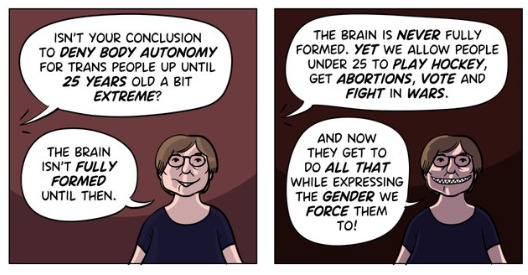
Fact
The Cass Review does not contain any recommendation or suggestion advocating for the withholding of transgender healthcare until the age of 25, nor does it propose a prohibition on individuals transitioning.
Explanation
This myth appears to be a misreading of one of the recommendations.
The Cass Review expressed concerns regarding the necessity for children to transition to adult service provision at the age of 18, a critical phase in their development and potential treatment. Children were deemed particularly vulnerable during this period, facing potential discontinuity of care as they transitioned to other clinics and care providers. Furthermore, the transition made follow-up of patients more challenging.
Cass then says,
Taking account of all the above issues, a follow-through service continuing up to age 25 would remove the need for transition at this vulnerable time and benefit both this younger population and the adult population. This will have the added benefit in the longer-term of also increasing the capacity of adult provision across the country as more gender services are established.
Cass want to set up continuity of service provision by ensure they remain within the same clinical setting and with the same care providers until they are 25. This says nothing about withdrawing any form of treatment that may be appropriate in the adult care pathway. Cass is explicit in saying her report is making no recommendations as to what that care should look like for over 18s.
It looks the myth has arisen from a bizarre misreading of the phrase “remove the need for transition”. Activists appear to think this means that there should be no “gender transition” whereas it is obvious this is referring to “care transition”.
-
Myth 3: Cass is demanding only Double Blind Randomised Controlled Trials be used as evidence in “Trans Healthcare”
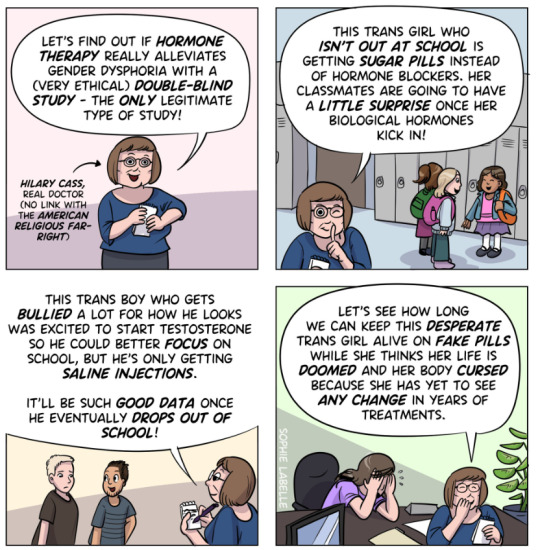
Fact
While it is acknowledged that conducting double-blind randomized controlled trials (DBRCT) for puberty blockers in children would present significant ethical and practical challenges, the Cass Review does not advocate solely for the use of DBRCT trials in making treatment recommendations, nor does it mandate that future trials adhere strictly to such protocols. Rather, the review extensively discusses the necessity for appropriate trial designs that are both ethical and practical, emphasizing the importance of maintaining high methodological quality.
Explanation
Cass goes into great detail explaining the nature of clinical evidence and how that can vary in quality depending on the trial design and how it is implemented and analysed. She sets out why Double Blind Randomised Controlled Trials are the ‘gold standard’ as they minimise the risks of confounding factors misleading you and helping to understand cause and effect, for example. (See Explanatory Box 1 in the Report).
Doctors rely on evidence to guide treatment decisions, which can be discussed with patients to facilitate informed choices considering the known benefits and risks of proposed treatments.
Evidence can range from a doctor’s personal experience to more formal sources. For instance, a doctor may draw on their own extensive experience treating patients, known as ‘Expert Opinion.’ While valuable, this method isn’t foolproof, as historical inaccuracies in medical beliefs have shown.
Consulting other doctors’ experiences, especially if documented in published case reports, can offer additional insight. However, these reports have limitations, such as their inability to establish causality between treatment and outcome. For example, if a patient with a bad back improves after swimming, it’s uncertain whether swimming directly caused the improvement or if the back would have healed naturally.
Further up the hierarchy of clinical evidence are papers that examine cohorts of patients, typically involving multiple case studies with statistical analysis. While offering better evidence, they still have potential biases and limitations.
This illustrates the ‘pyramid of clinical evidence,’ which categorises different types of evidence based on their quality and reliability in informing treatment decisions

The above diagram is published in the Cass Review as part of Explanatory Box 1.
We can see from the report and papers that Cass did not insist that only randomised controlled trials were used to assess the evidence. The York team that conducted the analyses chose a method to asses the quality of studies called the Newcastle Ottawa Scale. This is a method best suited for non RCT trials. Cass has selected an assessment method best suited for the nature of the available evidence rather than taken a dogmatic approach on the need for DBRCTs. The results of this method were discussed about countering Myth 1.
Explainer on the Newcastle Ottawa Scale
The Newcastle-Ottawa Scale (NOS) is a tool designed to assess the quality of non-randomized studies, particularly observational studies such as cohort and case-control studies. It provides a structured method for evaluating the risk of bias in these types of studies and has become widely used in systematic reviews and meta-analyses.
The NOS consists of a set of criteria grouped into three main categories: selection of study groups, comparability of groups, and ascertainment of either the exposure or outcome of interest. Each category contains several items, and each item is scored based on predefined criteria. The total score indicates the overall quality of the study, with higher scores indicating lower risk of bias.
This scale is best applied when conducting systematic reviews or meta-analyses that include non-randomized studies. By using the NOS, researchers can objectively assess the quality of each study included in their review, allowing them to weigh the evidence appropriately and draw more reliable conclusions.
One of the strengths of the NOS is its flexibility and simplicity. It provides a standardized framework for evaluating study quality, yet it can be adapted to different study designs and research questions. Additionally, the NOS emphasizes key methodological aspects that are crucial for reducing bias in observational studies, such as appropriate selection of study participants and controlling for confounding factors.
Another advantage of the NOS is its widespread use and acceptance in the research community. Many systematic reviews and meta-analyses rely on the NOS to assess the quality of included studies, making it easier for researchers to compare and interpret findings across different studies.
As for future studies, Cass makes no demand only DBRCTs are conducted. What is highlighted is at the very least that service providers build a research capacity to fill in the evidence gaps.
The national infrastructure should be put in place to manage data collection and audit and this should be used to drive continuous quality improvement and research in an active learning environment.
-
Myth 4: There were less than 10 detransitioners out of 3499 patients in the Cass study.

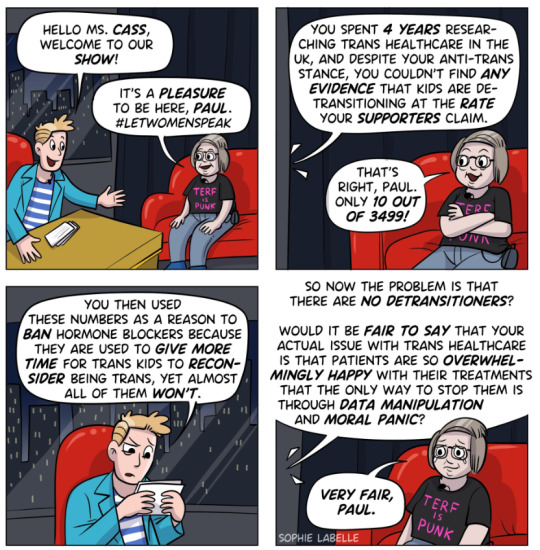
Fact
Cass was unable to determine the detransition rate. Although the GIDS audit study recorded fewer than 10 detransitioners, clinics declined to provide information to the review that would have enabled linking a child’s treatment to their adult outcome. The low recorded rates must be due in part to insufficient data availability.
Explanation
Cass says, “The percentage of people treated with hormones who subsequently detransition remains unknown due to the lack of long-term follow-up studies, although there is suggestion that numbers are increasing.”
The reported number are going to be low for a number of reasons, as Cass describes:
Estimates of the percentage of individuals who embark on a medical pathway and subsequently have regrets or detransition are hard to determine from GDC clinic data alone. There are several reasons for this:
Damningly, Cass describes the attempt by the review to establish “data linkage’ between records at the childhood gender clinics and adult services to look at longer term detransition and the clinics refused to cooperate with the Independent Review. The report notes the “…attempts to improve the evidence base have been thwarted by a lack of cooperation from the adult gender services”.
We know from other analyses of the data on detransitioning that the quality of data is exceptionally poor and the actual rates of detransition and regret are unknown. This is especially worrying when older data, such as reported in WPATH 7, suggest natural rates of decrease in dysphoria without treatment are very high.
Gender dysphoria during childhood does not inevitably continue into adulthood. Rather, in follow-up studies of prepubertal children (mainly boys) who were referred to clinics for assessment of gender dysphoria, the dysphoria persisted into adulthood for only 6–23% of children.
This suggests that active affirmative treatment may be locking in a trans identity into the majority of children who would otherwise desist with trans ideation and live unmedicated lives.
I shall add more myths as they become spread.
==
It's not so much "myths and misconceptions" as deliberate misinformation. Genderists are scrambling to prop up their faith-based beliefs the same way homeopaths do. Both are fraudulent.
#Andy L.#Cass Review#Cass Report#Dr. Hilary Cass#Hilary Cass#misinformation#myths#misconceptions#detrans#detransition#gender affirming healthcare#gender affirming care#gender affirmation#affirmation model#medical corruption#medical malpractice#medical scandal#systematic review#religion is a mental illness
386 notes
·
View notes
Text
Levi Ackerman
Had the urge to post about this. I can't wrap my head around the fact that many people irl and online see Levi as a character without feelings, cold, harsh and full of himself. Wtf is going on? He is the most empathetic and resilient person in AOT? He just has a bitter and dry sense of humor. He is one of the most caring throughout the whole series 😾
Sorry for any typos english is not my first language

#levi headcanons#levi aot#levi ackerman#captain levi#aot#attack on titan#hear me out#misconceptions#shingeki no kyojin#shingeki no kyoujin levi
135 notes
·
View notes
Text
Mspec Lesbian Misconceptions
I still get exclusionary comments and reblogs on my friend's mspec lesbian infographic so I thought I'd make a sort of 'addon post' that answers basically everything!
Please check the infographic out! It's much shorter and it looks pretty

🌺 "Mspec always means that you're attracted to men"
⤷ Mspec is short for the 'multisexual (or other multi- attraction type) spectrum', meaning the attraction to multiple genders. Most folks who experience attraction to women and non-binary genders don't consider themselves mspec, but that doesn't mean that nobody can
⤷ As we understand the complexities of gender more and move past the 'only two genders' way, what counts as being bi or otherwise mspec will change
🌺 "There's no reason to reclaim old uses for the word lesbian from before lesbian separatism"
⤷ Lesbian separatists tried to exclude anyone that associated themselves with men or masculinity from lesbianism. This included bi people, trans people, butches and mascs, lesbians still married to men, lesbians living with men, and more. Some went as far as considering butch-for-femme relationships to be harmful. Why wouldn't people want to reclaim lesbian from a time before this ideology spread? See more here
🌺 "But bi women wanted to make their own spaces and stop using lesbian spaces and the lesbian label" ⤷ Obviously, some bi sapphics of the time would've wanted to be distinctly and only viewed as bi, and have no affiliation with lesbians, but plenty didn't. Implying that the rise of radical feminism in the lesbian community was wanted by all of the people they excluded is ridiculous. It wasn't a consensus
🌺 "Mspec lesbians just want to feel included in lesbian spaces"
⤷ You've hit the nail on the head actually, this isn't the gotcha you think it is. Mspec sapphics were originally welcome to use the word lesbian and exist in the lesbian community, and then they weren't, so some of them would like to be included again yes
🌺 "It takes away spaces that are just for monosexual lesbians"
⤷ There have been attempts made to create terms for monosexual lesbians (though usually people just mean 'not attracted to men' rather than monosexual), but the lesbian community thrived with bisexuals in it for a long time. Lesbian spaces are heavily dominated by monosexual lesbians as well
⤷ The real question here is why are you so keen to know for definite that nobody in your space is attracted to men? And what are you counting as 'attracted to men'? Are you assuming it based on dating habits? What label they use? What you consider to be attraction? Everyone views this stuff differently, you can't police it properly
🌺 "Lesbian can't be used in the split attraction model, it means no attraction to men at all"
⤷ Insisting that someone has to use 'homoromantic' rather than lesbian just because they're bisexual or vice versa is pointless. Not only is lesbian a more open and functional label (it specifies attraction to women and doesn't imply that the user is also a woman), but defining it as an absence of attraction to men is very 1970s lesbian separatist of you
🌺 + "If you're fluid between mspec and lesbian just say abrosexual", "If you heavily prefer women just say homoflexible" and so on so forth
⤷ There are probably terms that technically apply to you that you don't use because you're not connected to the label or it doesn't fit quite right. The same applies here. Abrosexual is very broad, homoflexible implies 'same gender' attraction to women, and we've established that there's nothing stopping them from using mspec and lesbian instead

#lesbian#misconceptions#mogai#lgbtq#pride month#radinclus#inclusion#inclusivity#lesbian positivity#lesbian awareness week#sapphic#wlw#nblw#queer#mogai flag#mspec lesbian#bi lesbian#pan lesbian#omni lesbian#lunian#lesbian pride#lesbian community#lesbian history#mspec#bisexual#bi#pansexual#pan#omnisexual#omni
91 notes
·
View notes
Text
Dog Man Misconceptions: A Starter Pack
Grampa is not the cause of Petey's flat tail. This would have had to have been Petey's own fault, because Grampa tried to tell the story to Li'l Petey in an attempt to embarrass Petey. I don't know about you, but a story about crushing/cutting/flattening your own son's tail is probably going to get you under hot water, not your son.
Plus, Petey kept cutting him off, implying that he doesn't want to hear the story again.
Both Petey and Li'l Petey can understand Dog Man's barking. Li'l Petey translates his barking twice, in Grime and Punishment and Mothering Heights respectively; since he's a clone of Petey, Petey should be able to, too.
That being said, Dog Man would likely use sign language for his other friends (Sarah, Chief, etc.); he just wouldn't have to with other cats.
Petey probably doesn't have the cloning machine as of book 11, or any of his inventions by that matter, since they all would have been buried under the rubble of his now-former house.
Molly never took Lightning Dude's place, she was just filling in his role during Dog Man 11 while he was occupied and couldn't do it. Then when they rebranded the Supa Buddies, they added Molly as a fourth member.
Despite his maturity level, Petey is probably among the youngest of the cast. Assuming Grace and Grampa didn't have a shotgun wedding (or anything similar), everyone who appeared in the Big Jim Begins flashbacks is older than Petey. This includes Chief, Big Jim, Genie/Nurse Lady, all the jail cats, and Dog Man himself (or at least his top half).
There are no anthropomorphic dogs. Greg, Zuzu, and the seven jail dogs from Brawl of the Wild are all regular dogs, and since we haven't seen "normal" versions of cats, pigs, frogs, etc, it's safe to say that all the dogs are "normal" too.
Fish are a gray area though; Flippy was a regular fish that was given enhanced intelligence, but the sealife in Fish Jail could talk from the beginning. That's interesting...
Big Jim was not part of the Critter Scouts rebellion in Lord of the Fleas, since that purple cat is way older than he would have been at the time.
The eponymous character's name is Dog Man (two words), not Dogman. It's never been spelled Dogman.
Similarly, the little kitten has an apostrophe in his name. It's officially Li'l Petey. Not Lil Petey. Not Little Petey. And definitely not L'il Petey. But unlike Dog Man, some official stuff has spelled it without the apostrophe for some reason.
Let me know if there's any more!
#dog man#dogman#I've seen a lot of theories and things around the fandom that's blatantly incorrect#so I had to compile them into a post#analysis#misconceptions
51 notes
·
View notes
Text
What woman benefits from war? The way people discuss it as righteous makes me feel less of a feminist sometimes even though we know there are handmaidens. It makes me think, forget even using the word (even though through experience I will never seek the company of a man for friendship) and make community elsewhere because some of us are not real people to y'all lmao. There are 208 nations (I'm sure there are more) and yet the ones that seem to matter are North America, the European Union and Australia and New Zealand. These discussions be turning into a G7 summit.
We need women to learn budgeting and financial freedom. We need women to learn how to use their resources and their land to survive. We need women to learn how to work in a community. To teach the herbal ways of abortion when the state is determined to force birth. We need women to be able to read and think for themselves. To trust themselves and get away from predators. To learn how to protect themselves. To advance each other's knowledge and write our stories so no dusty ass man ever steals it away.
Climate change will affect small island developing states first and yet we can agree it's important to fight.
Forced birth will make little girls mothers to their father's children and we can agree it's important to fight.
No access to voting reduces women to property and we agree it's important to fight.
We come to war and now it's "welllllll, not all cultures are equal" and we agree that's true and we need to fight but some of us go "let's try to find the women who are already fighting it and let's support them" and some of y'all go "actually yeah let's bomb the fuck out of them".
The all cultures are not equal argument doesn't even make sense when you consider that oil, gold, cobalt, diamond are the things that make a culture somehow equal because why is your government saddling up to human abuse defender country and you're on tumblr telling us about "oh they're getting bombed too".
You cannot even see beyond the labels that your privilege has shaped you to think of things under and you think you are equipped to condescend and control a conversation because you do not like how it attacks the power dynamic you benefit (even measly) from. Yet we know that whenever a woman has power, she has to work hard to keep it. And yet you maintain a power to condescend and try to subjugate to keep your precarious place, because you know it is precarious, because to openly reflect that you may be wrong about this, means that there are other things you might be wrong about as well. And it's an opportunity to learn and yet, it is thrown away.
It's why people are being assholes about covid precautions on Twitter and a surprising number of them women even though we know women are more likely to get long covid than men. US marines (supposed to be the toughest of the bunch) are getting covid and long covid. It's not about earned health or deserved health, it's about understanding that we were wrong about things like immune systems and virus transmissions. Covid is airborne, the flu is airborne, tuberculosis is airborne. Who knows what else is airborne?
We must learn to find ways to adjust to these life shattering misconceptions being broken because they will ultimately keep us alive. Until we are equal as a sex, they will always find ways to put us against each other and you must recognize this and resist.
#black women#brown women#feminism#radical feminism#anti war#covid 19#anti colonization#climate change#abortion#privilege#misconceptions
56 notes
·
View notes